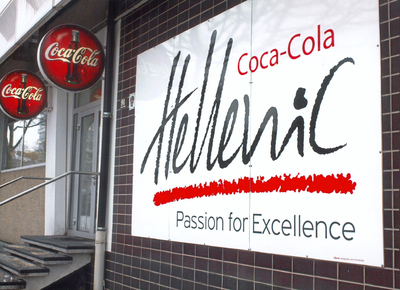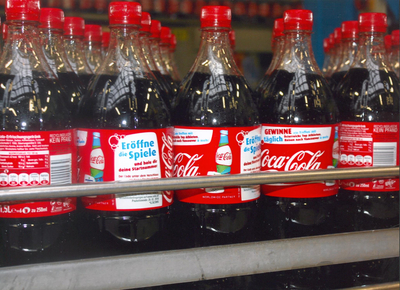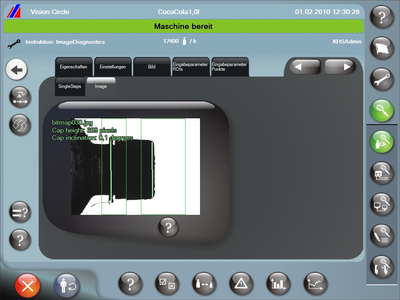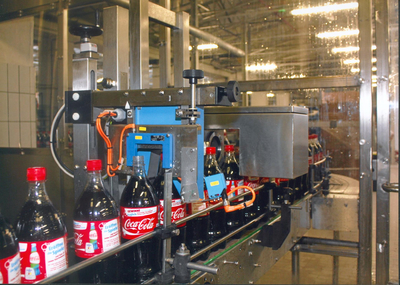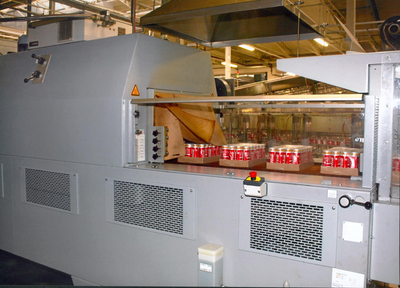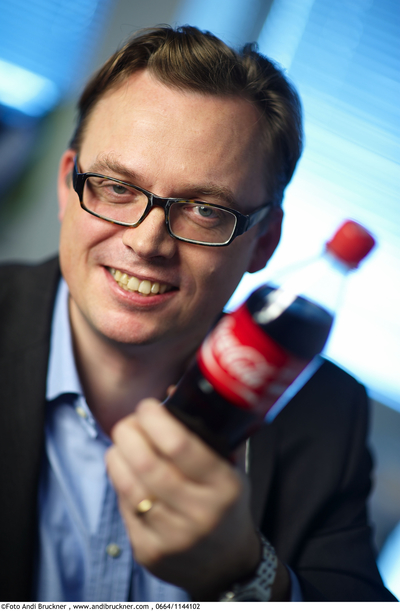
Coca-Cola Hellenic Austria Makes Highest Demands on Quality
Investment in a new Innocheck KHS inspection platform proves convincing
Ralph Pohl* It was the year 1929 when the Coca-Cola success story began on the Austrian market. In the early days the industry was dominated by a number of smaller bottlers; now Coca-Cola Hellenic Austria, a subsidiary of the Coca-Cola Hellenic Group based in Athens, Greece, currently has two production sites, each with their own clearly designated areas of work. The plant in Vienna is responsible for the production of soft drinks, such as Coca-Cola, Coke light, Coca-Cola zero, Fanta, Sprite, mezzo mix, and the energy drink Burn. Römerquelle at the Edelstal site, made part of Coca-Cola Hellenic Austria in 2003, bottles classic mineral water and health drinks based on mineral water with an innovative range of flavors that include pear and lemon balm, blackberry and lime, and also lemon grass. As in its formative years, the chief objective of Coca-Cola Hellenic Austria is to live up to the trust of the consumer in Coca-Cola brand products in all respects. This calls for the highest demands on quality, rooted in the top quality standards that are imposed on all suppliers to the company. When it came to recently investing in new inspection technology for an existing filling line installed at the Vienna plant, there was one clear choice: inspection technology from KHS. Erwin Langela, Manufacturing Manager for Coca-Cola Hellenic Austria, says, "The new KHS fill level check and crooked cap inspection fully meet our requirements. We are extremely satisfied. Not only the quality is right; the system is also simple to operate and can be extended as and when required, making it both flexible and future proof." Austria's number one for soft drinks and mineral water The great importance Coca-Cola Hellenic Austria holds for the Austrian market is partly attributable to the relationship consumers have built up with "their Coca-Cola brands", according to Langela. "In Austria, the Coca-Cola brand Cappy has become practically synonymous with orange juice," he explains. "And that's just one of many examples that demonstrate just how closely consumers are tied to these products." These strong ties are backed up by impressive figures. For example, Coca-Cola Hellenic Austria is number one in Austria for soft drinks and mineral water. Each year around 50,000* Manager, KHS Austria, Wiener Neudorf, Phone: +43 (2236) 62510-221 customers in the restaurant and food retail trades and thus up to 8.4 million consumers are supplied with Coca-Cola brand products from seven distribution centers. A strong parent in Coca-Cola Hellenic As a 100% subsidiary of the Coca-Cola Hellenic Group based in Athens, founded in 2000 when Coca-Cola Beverages merged with the Greek Hellenic Bottling Company SA, Coca-Cola Hellenic Austria can rely on backing from a strong parent company. Today, Coca-Cola Hellenic Austria is the second-largest bottler of brand products for the Coca-Cola Company worldwide and the biggest in Europe. The Coca-Cola Hellenic Group has a total of 80 production sites employing over 48,000 people in 28 countries worldwide. The yearly sales volume is 2.1 billion unit cases (11.9 billion liters), serving about 560 million consumers. Within the Coca-Cola Hellenic Group everything is clearly organized in sectors, entitled Emerging Markets, Developing Markets, and Established Markets. In addition to Austria, other established markets include Greece, Italy, Northern Ireland, Switzerland, and Cyprus. Countries such as Hungary, Croatia, Poland, and Slovakia are defined as developing markets. The emerging markets cover areas including Russia, Romania, Serbia, Ukraine, and also the African state of Nigeria. Widespread line-up encourages comprehensive technical expertise The Coca-Cola Hellenic Group's widespread line-up and the vast number of production sites is something Langela considers exceptionally positive. "This enables a broad range of expertise to be built up, which each and every site can profit from. This knowledge can also always be centrally accessed when investing in technical systems." Champions of innovative KHS inspection technology As far as innovative KHS inspection technology is concerned, Coca-Cola Hellenic Austria has recently become a clear champion of KHS expertise within the group, with the Innocheck system newly established at the Vienna plant a KHS pilot system. This pilot setup has been integrated into an existing PET line. Maximum ease of operation KHS' new inspection technology is characterized by maximum ease of operation. "Our people have become familiar with the system within a very short time," enthuses Langela, "as the system's operator prompting is particularly simple. Here, the line works for the operators and not the operators for the line which, among other things, increases line efficiency." Innocheck platform To date, the Innocheck platform at Coca-Cola Hellenic Austria includes an Innocheck CUB control unit with a touch-screen monitor for operation and visualization, and also an Innocheck FLC fill level check and Innocheck CCI crooked cap inspection. Innocheck FLC fill level check After filling and capping, PET bottles are then conveyed to the Innocheck quality assurance system. A light barrier checks the presence of each individual PET bottle before the fill level checker. The Innocheck CUB then computes exactly how many conveyor cycles elapse before the fill level is measured. The PET bottles are tracked in real time. The fill level is measured within a high-frequency measurement bridge. Measurements are immediately communicated to the Innocheck CUB control unit, where they are processed. If fill levels are not within the given tolerances, the Innocheck CUB sends this information straight to the rejection system. A pneumatically controlled buffer ensures that any underfilled or overfilled PET bottles are rejected. Maximum and minimum fill levels can be easily set in the Innocheck system; the operator simply has to open the fill level check settings menu on screen and in a few steps the Innocheck CUB control unit has been taught the defaults for the new measurement levels. Innocheck CCI crooked cap inspection A second light barrier checks the presence of the PET bottles before they pass through the crooked cap inspection station. Although it would be possible to calculate the exact conveyor cycles up to the second inspection station based on the first trigger, any line downtime, however, could cause inspection problems. If the filling and capping process were to be interrupted, as a rule a few PET bottles would become stuck between the two control mechanisms. Initiating triggering before the bottles enter the Innocheck CCI ensures that conveyor cycles are stipulated with absolute precision and according to the given situation right up to crooked cap inspection. A high-resolution CCD camera built into a protective stainless steel housing is used in crooked cap inspection. Motorized height adjustment enables the CCD camera to be accurately altered to fit the size of bottle due for inspection. A telecentric lens guarantees that the distance between the PET bottles and camera does not hinder the accuracy of the images. This means, for example, that inaccurately adjusted guide railings, should there be any, are no longer of any importance. Telecentric imagery and special LED lighting provide perfect acutance in the image. Another great advantage is that the camera system is not dependent on extraneous light. This is achieved by the type of lighting on the one hand and the protective housing on the other. As the manner in which PET bottles are manufactured means their heights can vary slightly, before taking an image the camera system scans the bottom edge of the neck ring on each individual PET bottle, photographing caps starting at the neck ring within a given measurement window. Possible discrepancies in PET bottle height thus do not affect the quality of the images. These defaults can be easily changed using the on-screen settings menu for crooked cap inspection. Even if present stipulations envisage only the inspection of classic plastic caps, this does not always have to be the case. Innocheck CCI is able, for example, to also perfectly inspect metal caps, crown corks, and sports caps. If new cap types are added for inspection later, the Innocheck CUB facilitates easy learning of the suitable command chains with the help of ready-made program tools. Comprehensive information attractively presented The results of the fill level check and crooked cap inspection are processed and attractively presented on the Innocheck platform screen. Whether measurement curves showing fill levels or rejection rates caused by crooked caps or individual measurements of single PET bottles, all this and much more can be prepared in accordance with special requirements. Permanent plausibility checks Another feature of great importance is that the Innocheck platform can check itself. Permanent plausibility checks are carried out at the light barriers. Any malfunctions are immediately communicated. One Innocheck platform for all inspection functions "With KHS' new inspection technology, utmost precision goes hand in hand with maximum information and fast setting capabilities," says Langela. "At the same time we greatly appreciate the high level of flexibility the system offers us, enabling us to integrate additional inspection instruments into the Innocheck platform in full accordance with our requirements." Modular concept KHS' innovative inspection technology is based on a modular concept. Should Coca-Cola Hellenic Austria wish to integrate further inspection features into the system, such as tamper-evident seal inspection, leakage check, bottle alignment, labeling inspection, or filler management, for example, this is perfectly feasible. Required measurement systems with upstream light barriers can be installed in series. The necessary standard software is already installed in the Innocheck CUB control unit and once activated can be equally easily adapted to suit required individual standards as the previously described fill level check and crooked cap inspection. Additional Innocheck IFMS filler management system already planned Coca-Cola Hellenic Austria is currently considering extending the Innocheck platform to include an additional filler management system, the Innocheck IFMS. The clear advantage of the filler management system is that each PET bottle is directly allocated to a filling valve and capper head. A permanently underfilling filling valve, for example, can be quickly ascertained by the filler management system. Operators are also able to react quickly to malfunctioning filling valves and capper heads, thereby increasing line efficiency. In order to establish the filler management system at Coca-Cola Hellenic Austria, further signals must be communicated between the filler and capper and the Innocheck CUB control unit. It's also important that a light barrier be integrated at the discharge of the filler/capper monoblock and – due to the specific configuration of the filler/capper monoblock at Coca-Cola Hellenic Austria – that light barriers be installed at the conveyor transitions upstream of the Innocheck CUB. Once all this has been implemented, the relevant filler management software simply has to be activated and filler management can start! "Complexity is an alien concept as far as this system is concerned," says Langela. Hardware also flexible Not only the software for the Innocheck platform is ingenious; the hardware can also be quickly and easily adapted to suit new situations. If a computer module in the control unit reaches its limits of performance, all that is needed is to open the CUB terminal and insert another module. It just couldn't be simpler. Pole position as regards investment in an eco shrink tunnel "As with our new Innocheck platform, we had similarly good experience with KHS when we recently invested in a new Innopack TSP tray shrink packer equipped with an eco shrink tunnel," Langela claims. "We were also able to occupy pole position within the Coca-Cola Hellenic Group when we invested in the eco shrink tunnel." The eco shrink tunnel concept lives up to its name mainly in that it saves up to 50 percent more energy versus the conventional type of shrink tunnel. For companies such as Coca-Cola Hellenic Austria within the Coca-Cola Hellenic Group which aspire to reach a high level of environmental awareness, there is a further positive aspect to the eco shrink tunnel, namely that the environment benefits from a reduction in CO2 emissions of up to 60%. The reason for this is that gas is converted directly into heat. In the case of electric heating, CO2 emissions are always considerably higher as a result of the multiple energy conversion involved in generating electricity. Trust biggest asset Langela says, "When all's said and done, with these two innovative technical solutions KHS has once again proved that we have a partner we can trust." The Coca-Cola Hellenic Group places great emphasis on trust. Group guidelines governing the "implementation of our mission and values", for example, include the following words: "Trust is our biggest asset. Our success is based on our good reputation. As a committed team, we face new challenges every day and strive to keep and improve our good reputation." Innovative KHS inspection technology is doing its bit in the field of quality assurance to maintain and continue to boost the trust the Austrians have in Coca-Cola products.

